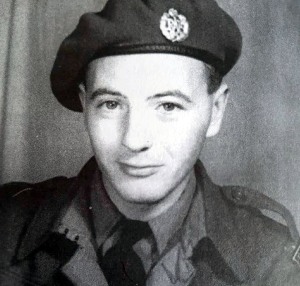
2744 Squadron, Royal Air Force Volunteer Reserve, Royal Air Force Regiment.
Harry Green was born on 18th August, 1920, in Ossett, the eldest child of Francis Green and his wife Emma (nee Collier) who married in Ossett in late 1919. There were three more children: Annie (born 1923), Honrene (b. 1924) and Jack (b. 1927).
In 1939, Francis Green, a hairdresser and shopkeeper and his wife Emma were living at School Street, Gawthorpe with daughter Honrene Green (born 1924) plus one more person with name redacted. At that time, Harry Green was actually living at 28, Hillcrest Avenue, Gawthorpe with his grandparents John (a farm worker) and Fanny Green with Harry working then as a grocer’s assistant.
Harry Green enlisted in the RAF on 19th July, 1940, initially as an Aircraft Hand/General Duties before remustering to become a Ground Gunner in October the same year. He then served at Honington, followed by Mildenhall, before joining No. 2721 Defence Squadron in August, 1941. Promoted to Corporal in November that year, Harry Green remained with No. 2721 Squadron for the remainder of the war, serving in North Africa, Italy and Palestine. He finally held with Nos. 4 and 2 RAE Regiment Sub Depots in the latter part of 1945 and the beginning of 1946, and then at Deenethorpe, prior to his release from the Service on the 30th June, 1946.
The “Ossett Observer” had this report:1
“Ossett Corporal – Outstanding Courage – Military Medal Award – We have received an announcement from the Ministry of Information that Corporal Harry Green R.A.F.V.R. Regiment of Ossett has been awarded the Military Medal. We have not, so far, been able to trace his family in the town, but the official document states that he was born in 1920 and that his home is in Ossett, and that he was a grocer’s assistant before enlisting in 1940. The citation is as follows:
Corporal Green has led his section on patrols against the enemy, and has at all times displayed outstanding courage and devotion to duty, qualities which have been reflected in the efficiency of those under his command. During the concentration of the 2nd Polcorps at San Sofia, it became essential to discover the precise position of the enemy prior to an attack being made. On 15th October Corporal Green led a patrol detailed to go to Collinadi Pondo. Leading his men on a wide detour through enemy-held territory, Corporal Green approached his objective from the flank unobserved. As the first building entered by the patrol showed signs of recent occupation Corporal Green went on to the next farm, where the enemy were encountered in great strength. During this attack a German sentry was killed and other casualties inflicted on the enemy. Corporal Green realising that at least one member of his patrol must get back and report the position directed covering fire to be made on the patrol to take cover in a nearby wood. Although an enemy machine-gun was now in action, Corporal Green succeeded in withdrawing his men and the patrol returned without a casualty.”
Corporal Green led this patrol for which he was awarded the Military Medal. His own, rather modest account of the action is as follows:
“On October 16th, one partisan, two men and myself volunteered to reconnoitre a house and farm that we had so far left alone, knowing that Jerry occupied these buildings. On the 18th we were moving out and a Polish Division was taking over to put in a push for the hills overlooking Bologna, 10 miles in front of us. Our job was to find out if Jerry still occupied this house. We had left our position at 12.00 hours and had to be back by 15.00 hours; we had a return march of nearly 12 miles. We arrived within 2,000 yards of our objective at 13.00 hours and went down to observe the place for movement. After half an hour we had seen no movement so we decided to go right in. One man and one partisan on the left of the house, and one man and myself on the right. This we did and arrived in the farm yard without any challenge or trouble. As my two left men were approaching the door a grenade was thrown at them from a well concealed slit trench; neither were hit but both put in a burst of fire into the trench from their Tommy Guns, killing one and badly hitting another. Meanwhile, on our side we had surprised a sentry, asleep in a hay stack. He never knew what hit him; the third one I caught through a window, making three killed and one more injured. We had found out what we wanted, so away we went, arriving back at our base, no casualties, and only 10 minutes late.”
Harry Green died in the Portsmouth area in November 1994 aged 74 years.
My thanks to Andrea Hartley for providing the reference for Corporal Harry Green.
References: